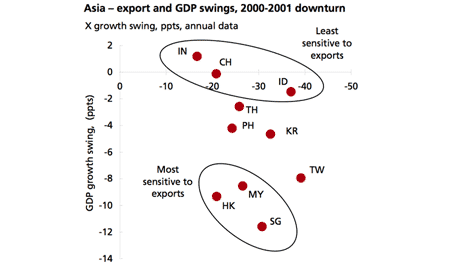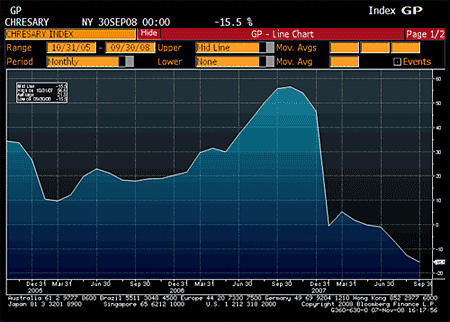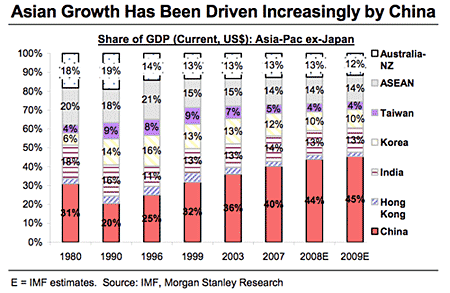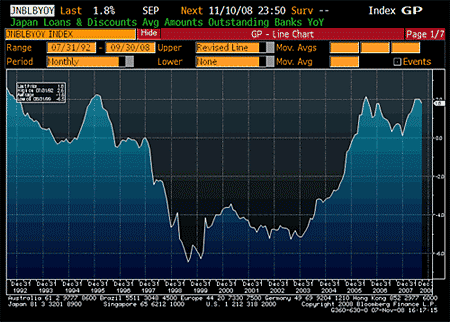Can China spend its way out of trouble?
China recently announced a £370bn 'Keynesian' package to prop up its domestic growth and reduce the impact of the global recession. With the rest of the region so heavily dependent on the health of China's economy, Cris Sholto-Heaton examines what effect Beijing's spending spree will have.

Get the latest financial news, insights and expert analysis from our award-winning MoneyWeek team, to help you understand what really matters when it comes to your finances.
You are now subscribed
Your newsletter sign-up was successful
Want to add more newsletters?

Twice daily
MoneyWeek
Get the latest financial news, insights and expert analysis from our award-winning MoneyWeek team, to help you understand what really matters when it comes to your finances.

Four times a week
Look After My Bills
Sign up to our free money-saving newsletter, filled with the latest news and expert advice to help you find the best tips and deals for managing your bills. Start saving today!
This article is from MoneyWeek Asia, a FREE weekly email of investment ideas and news every Monday from MoneyWeek magazine, covering the world's fastest-developing and most exciting region. Sign up to MoneyWeek Asia here.
Two years ago, Wen Caixia left her home village in Hubei province and travelled to Guangdong to work in a shoe factory. Now she and thousands like her are catching the return train. Falling wages mean she can no longer afford to live in an expensive city, and she would be better off back in the countryside, she told China Daily last week, as she waited at Guangzhou station.
Work is drying up in Guangdong, China's manufacturing hub, as exports falter and factories go out of business. Job vacancies in the province have dropped 17% year-on-year, according to one official.
MoneyWeek
Subscribe to MoneyWeek today and get your first six magazine issues absolutely FREE

Sign up to Money Morning
Don't miss the latest investment and personal finances news, market analysis, plus money-saving tips with our free twice-daily newsletter
Don't miss the latest investment and personal finances news, market analysis, plus money-saving tips with our free twice-daily newsletter
Stories like this one are becoming more and more common in the Chinese press. If anyone still doubts that Asia will be profoundly affected by the global slowdown, they should look beyond the statistics and read the newspapers.
Asia is not a single economy. Some countries will do much better than others. But the next few months will be tough for everyone. After that? It's all down to China
The chart below from DBS shows how Asian economies performed as a result of the 2000-01 export downturn. The horizontal axis shows how much exports fell by during the slump, while the vertical axis shows what happened to GDP over the same period. You can see that Hong Kong, Malaysia and Singapore are the most sensitive to export slumps, with GDP growth dropping 8-12 percentage points. At the other end of the scale, China, India and Indonesia were the least affected.

But that was then and this is now. While this is still a useful guide to the most exposed economies, the global downturn is set to be much more severe and Asia will have to take much stronger action to ease it through the next year and get growth back on course.
Lower interest rates won't be enough
Asia's big advantage today is falling inflation. Unlike most emerging markets, the region is a substantial net importer of commodities. That means the collapse in the price of oil, metals and foodstuffs will work in its favour. Asian central banks have already begun to slash interest rates, with more cuts certain to follow over the next few months.
But monetary policy won't be enough by itself, given the size of the shock to the world's financial system. Countries will have to add fiscal policy tax cuts, increased public spending and perhaps other, more unusual measures to help cushion their economies.
China is the best placed to do this. It has a substantial trade surplus, the world's largest foreign exchange reserves, the government budget is in a slight surplus and all government, corporate and household debts levels all look comfortable. So unlike the UK and the US, it actually has the money to spend on 'Keynesian' stimulus.
And in fact, China has just announced an RMB4trn (£370bn) package to support growth over the next two years. To put that amount into context, it amounts to around 15% of GDP. Probably only a quarter or so of the spending is completely new, but the fact that the rest is being accelerated and pulled together into one package demonstrates that China is determined to support domestic growth.
So what are China's problems and what is it likely to do about them? Well, exports are slowing. While important, China is less dependent on exports than is often thought. At around 40%-50% of GDP, investment actually accounts for a larger share of GDP than exports. But keeping business investment going will be difficult, since much of it was geared to adding export capacity.
Now that we have falling demand and too much capacity in many sectors, factories are more likely to be shuttering than expanding in the near future. The government is likely to push banks to lend to small businesses, to reduce taxes and to increase export subsidies, but the impact will probably be small.
Infrastructure spending, on the other hand, is relatively easy to boost. There's still huge scope for better rail, road, power and water networks across China, especially in the west of the country. This is the obvious place for the government to up spending.
Then there's the property sector which, as we've mentioned previously, is in the middle of a crunch. As the chart below shows, sales to individuals are plummeting as buyers go on strike for lower prices, driving many developers into bankruptcy.

This was largely deliberate: China didn't want an out-of-control property bubble. Now, with risks having lurched firmly to the downside, the government has removed controls on lending to property companies and loosened mortgage rules. But this may not get the sector going again. Buyers are likely to keep holding out for lower prices, especially since the broader economy is slowing.
Since construction is very important to the Chinese economy mainly for the millions of jobs it provides the government is likely to step up its direct presence in the sector. This could involve a substantial investment in affordable housing, for example some measures on these lines were announced at the same time as real estate lending was relaxed.
All this is a short-term boost to reduce the impact of the global recession. More importantly, China will probably also lay the foundations for stronger domestic demand ahead. This includes a better social welfare net to encourage people to spend: more spending on medical care and a system of pension savings that can follow workers around the country, for example.
There's also likely to be an effort to close the rural/urban income gap: we've just seen some moves towards giving farmers more rights over their land, but this is the start of a long-term reform. We'll also probably see increased subsidies and loans for the agricultural sector, and that will have more effect in the near-term.
Asia is becoming more dependent on China
Why are we focusing so much on China? Well, while most other Asian economies have scope to cut rates and increase government spending, the fact is that they're too small and too export-dependent for what they do to have a huge impact on their prospects if China doesn't hold up.
As you can see from the chart below, China is an ever-bigger contributor to Asia's growth, and it's no exaggeration to say that keeping China solid is absolutely crucial to keeping Asia on track. For example, Singapore will probably go into recession regardless but a strong China will make it a much milder recession and quicker recovery.

There are exceptions. As the first chart in this email suggests, India and Indonesia are much more domestically driven than most of Asia. In Indonesia's case, no-one has particularly high expectations for next year 5% GDP growth or so at best. And the economy will probably do fairly well once inflation eases and the central bank can begin cutting rates, although credit is likely to remain tight.
India, on the other hand, could disappoint investors who expect it to outperform over the next year. Yes, its exports account for only 15% of GDP. But India has benefited greatly from high liquidity and foreign investment and today has a substantial trade deficit and a large government budget deficit, which could limit its scope for fiscal flexibility. Add in the impending elections next May and all the political upheaval that's likely to cause and the near-term risks for India are much greater than they look.
Japan should be first out of recession
On the plus side, there's Japan. We don't talk about Japan much in this letter, because the main focus is on emerging markets, but it's a key part of Asia and strength there will help support its neighbours. And the good news is that while Japan entered recession ahead of the rest of the developed world, it's in better shape than most other developed economies and is likely to be the first out of recession next year.
Japan probably exited its multi-year slump around 2003-2005 and the latest downturn is a normal cyclical recession. The chart below, showing loans outstanding at Japanese banks supports this. After years of paying down its debt burden, Japan finally began to borrow again in 2005.

With the economy finally normalising, we should hopefully see a stronger Japan in the none-too-distant future. This would be a huge bonus, given that a number of developed countries especially the US and UK are at some risk of suffering their own lost decade.
Finally, the most important thing to remember about Asia's slowdown is that it's necessary. The export boom of the last few years has helped many economies to grow, develop and become stronger, but it could not continue indefinitely. Ultimately, Asia has to begin switching from export-focused to domestic demand.
It would have been good if governments had made moves to do this when times were good but no politician ever makes tough decisions when they don't have to. A sudden adjustment like this was always the most likely outcome and the next few months will undoubtedly be bumpy. But later next year we should start to see Asia recover ahead of the rest of the world.
Turning to the markets
| Market | Close | 5-day change |
| China (CSI 300) | 1678 | +0.9% |
| Hong Kong (Hang Seng) | 14243 | +2.0% |
| India (sensex) | 9964 | +1.8% |
| Indonesia (JCI) | 1338 | +6.5% |
| Japan (Topix) | 879 | -2.3% |
| Malaysia (KLCI) | 894 | +3.5% |
| Philippines(PSEi) | 1921 | -1.51% |
| Singapore (Straits Times) | 1863 | +3.9% |
| South Korea (KOSPI) | 1134 | +1.9% |
| Taiwan (Taiex) | 4742 | -2.6% |
| Thailand (SET) | 464 | +11.4% |
| Vietnam (VN Index) | 366 | +5.5% |
| MSCI Asia | 80 | +2.7% |
| MSCI Asia ex-Japan | 276 | -1.1% |
Asian markets closed the week mixed, after early rallies petered out on poor economic news from the US. However, credit markets improved: the rates at which banks lend to each other and the cost of insuring against firms defaulting on their debt continued to fall.
Corporate M&A activity is heating up among Japanese blue chips. Electronics giant Panasonic is looking to acquire its smaller rival Sanyo. The deal, which could be worth around 1trn (£6.5bn), would create the largest Japanese electronics firm and combine Sanyo green technologies with Panasonic's clout. Meanwhile Fujitsu is paying €450m (£52m) to buy out partner Siemens in their European computing joint venture. These two deals follow other major acquisitions in minerals, beverages, pharma and banking in recent weeks.
Chinese investors would be advised to brace themselves for more shocks after investment firm Citic Pacific's huge loss on foreign exchange two weeks ago. There are reports that toymaker Smart Union, which recently collapsed with the loss of 7,000 jobs, was partly brought down through RMB100m (£9m) in losses on an investment in a mining company, while shares in China High Speed Transmission, which makes gears for wind power transmission and vehicles, plunged after it announced a potential loss of up to RMB1.1bn (£102m) on a share swap deal with Morgan Stanley. With many Chinese firms rumoured to have invested in stocks, commodities and derivatives, the odds are high that the global market crash could claim many more victims.
Get the latest financial news, insights and expert analysis from our award-winning MoneyWeek team, to help you understand what really matters when it comes to your finances.

Cris Sholt Heaton is the contributing editor for MoneyWeek.
He is an investment analyst and writer who has been contributing to MoneyWeek since 2006 and was managing editor of the magazine between 2016 and 2018. He is experienced in covering international investing, believing many investors still focus too much on their home markets and that it pays to take advantage of all the opportunities the world offers.
He often writes about Asian equities, international income and global asset allocation.
-
 Alphabet 'is planning a 100-year bond': would you back Google for 100 years?
Alphabet 'is planning a 100-year bond': would you back Google for 100 years?Google owner Alphabet is reported to be joining the rare century bond club
-
 Pension Credit: should the mixed-age couples rule be scrapped?
Pension Credit: should the mixed-age couples rule be scrapped?The mixed-age couples rule was introduced in May 2019 to reserve pension credit for older households but a charity warns it is unfair